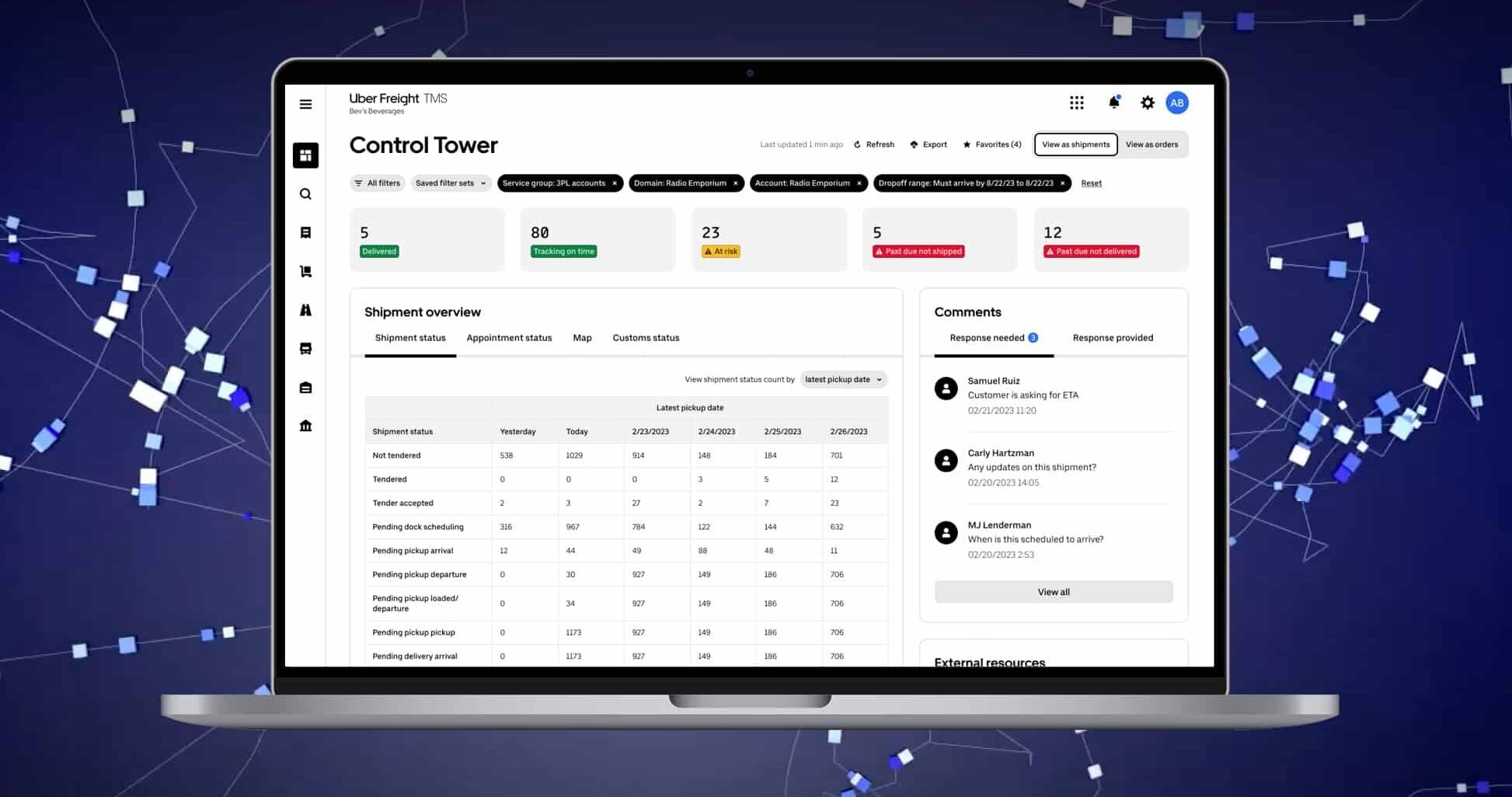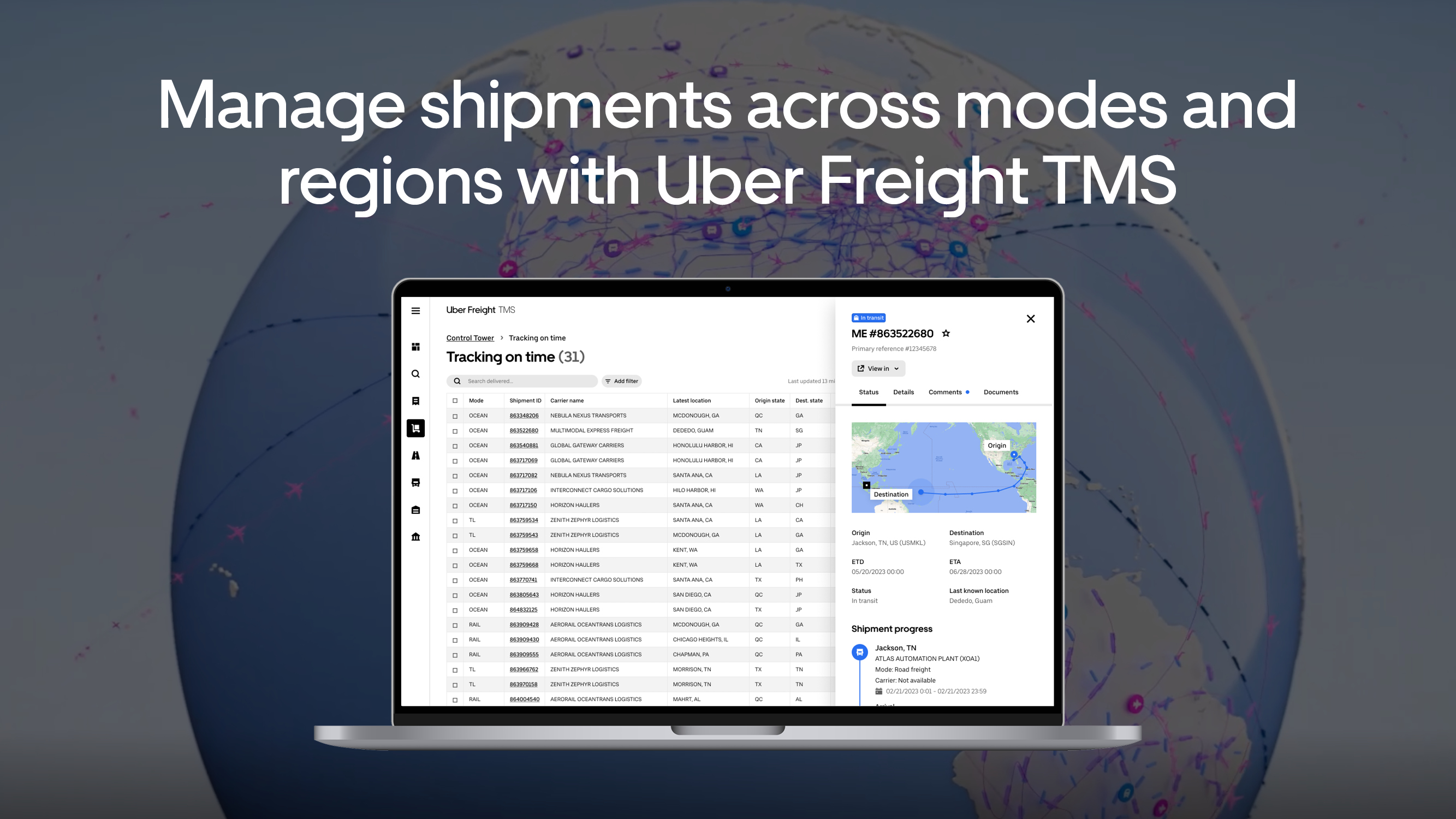
Meet the TMS software built for all shippers
Powered by actionable data and insights, Uber Freight TMS is the all-in-one solution for planning, executing, and managing logistics operations across modes and regions.
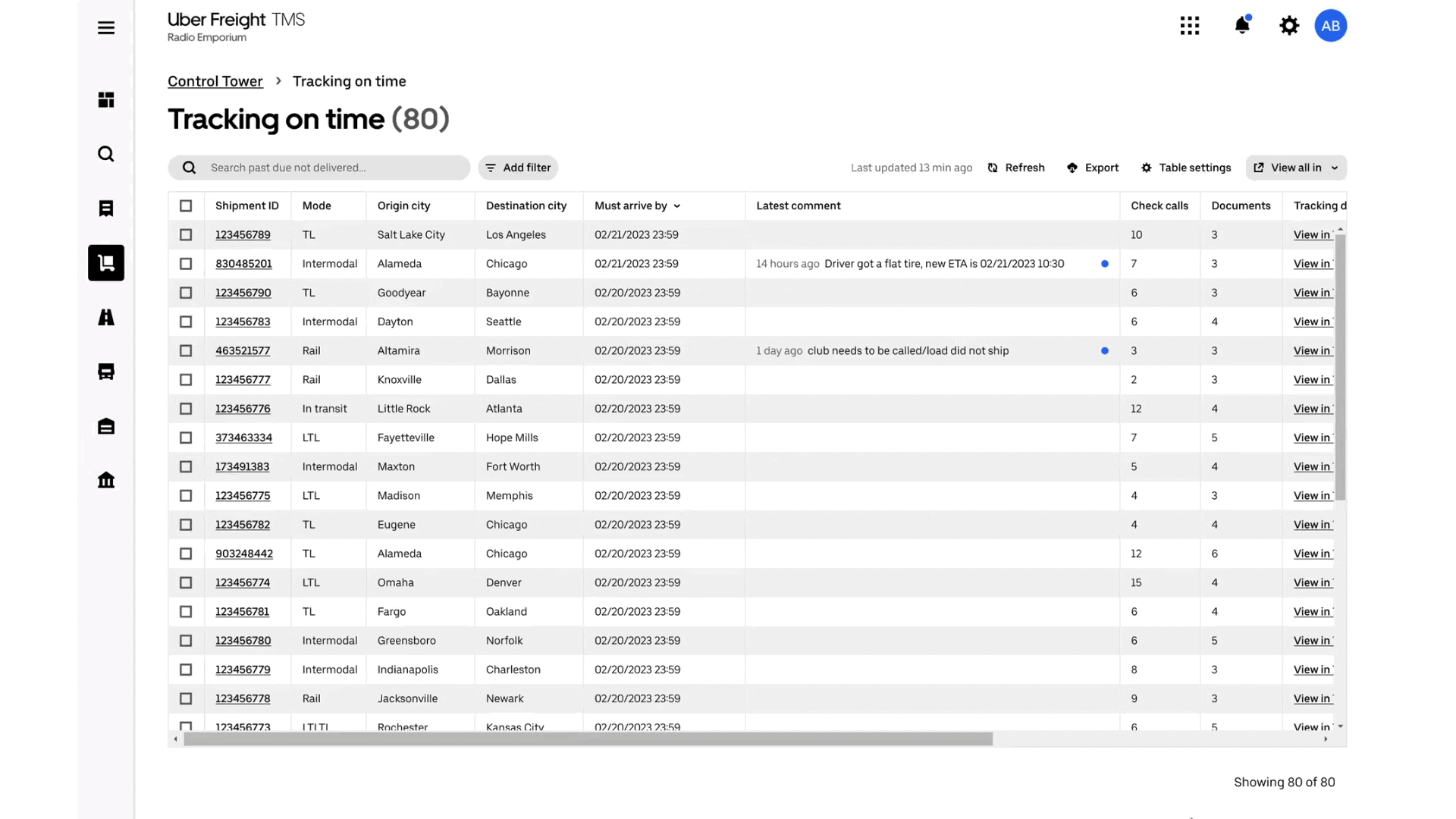
The transportation management system built for the now and the next
Since 2005, leading brands have trusted Uber Freight TMS to streamline their operations end-to-end, from procurement and execution to visibility and payments. With Uber Freight TMS today, shippers and their logistics partners can improve their networks while gaining visibility, foresight, and control across their shipments. They can also save time and money, improve cash flow, and achieve better business outcomes.
Benefits of our Transportation Management Software
Maximize ROI
Improve operational efficiency, optimize routes, and
reduce transportation costs
Reduce risk
Proactively identify and address planning, execution,
and settlement challenges
Gain visibility and control
Have eyes on your freight on any mode, anywhere,
at any time
Improve decision-making
Harness data and insights designed to help you grow
your business
Boost productivity
Streamline and automate your logistics operations
end-to-end
Not your average shipper TMS software
We’ve got your routing guide covered—and so much more—with Uber Freight TMS
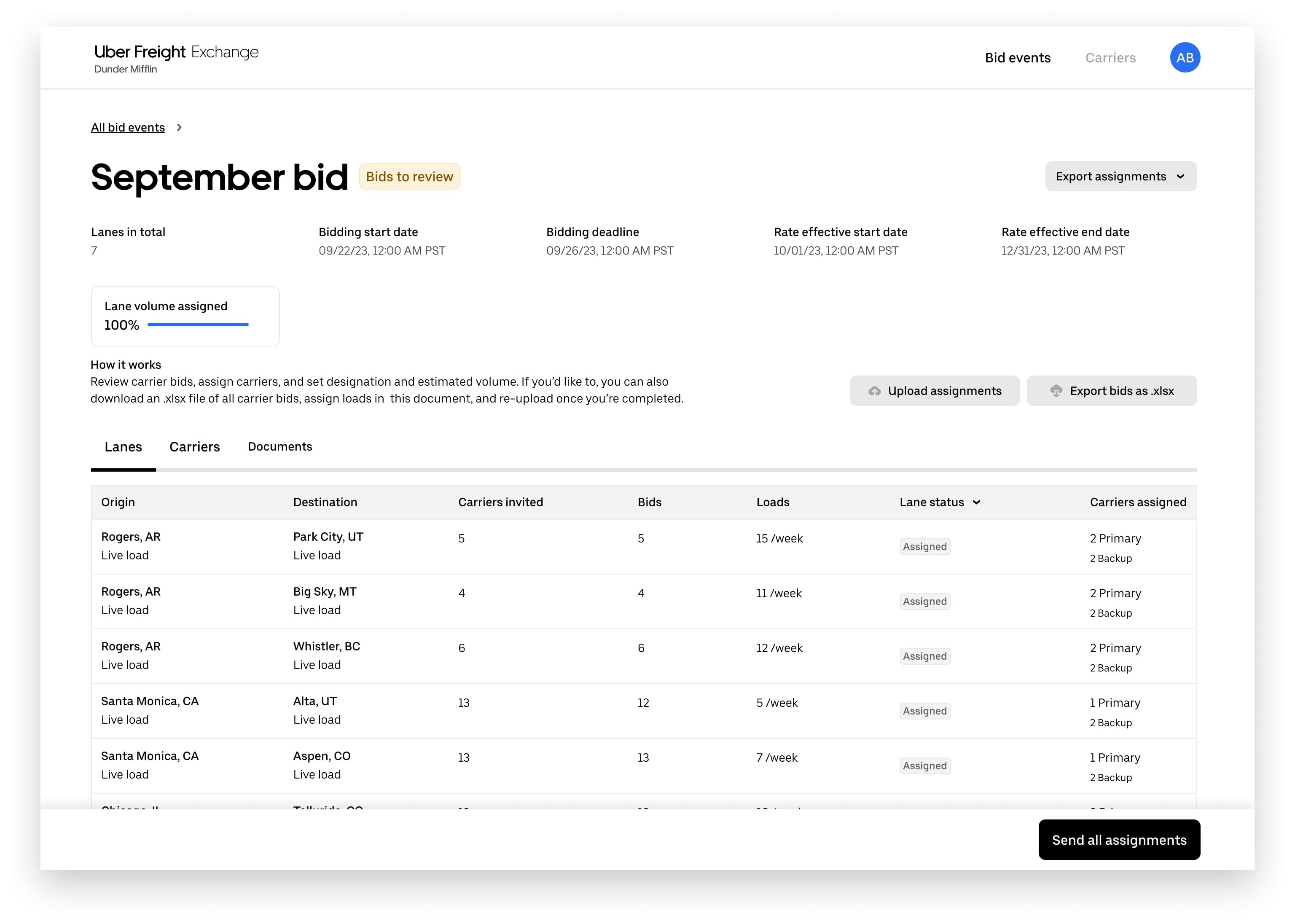
Procurement
Secure reliable and cost-effective freight capacity with speed and ease
- Get more accurate spot load estimates with Uber Freight’s predictive pricing models
- Run spot auctions or get instant quotes from multiple carriers, in one place
- Upload contract rates and routing guides directly from Uber Freight Exchange
- Get direct access to Uber Freight’s marketplace with procurement integrations
- Manage awards, contracts, and carrier communication for all your freight from one place
- Aggregate and analyze procurement scenarios and decisions to improve procurement strategies
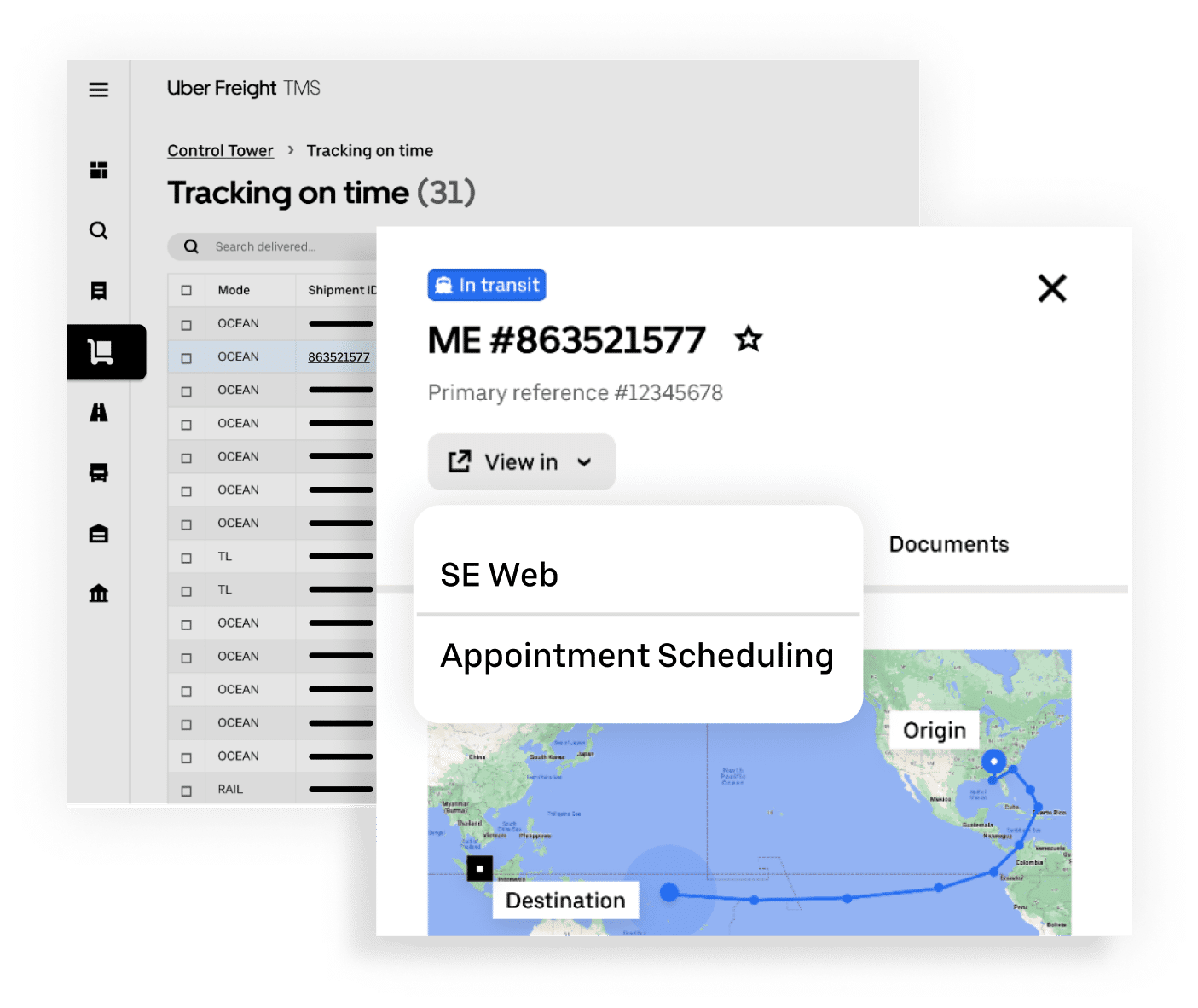
Execution
Optimize planning and execution across your multimodal network
- Optimize for price, capacity, mode, and service across your network with the Optimizer Tool
- Consolidate freight across modes including rail, truck, intermodal, and parcel
- Save money and reduce empty miles with smart load-matching to carriers and route planning
- Streamline dock appointments to prevent delays and promote productivity with Dock Scheduler
- Monitor carrier performance with transparent, data-driven carrier scorecards
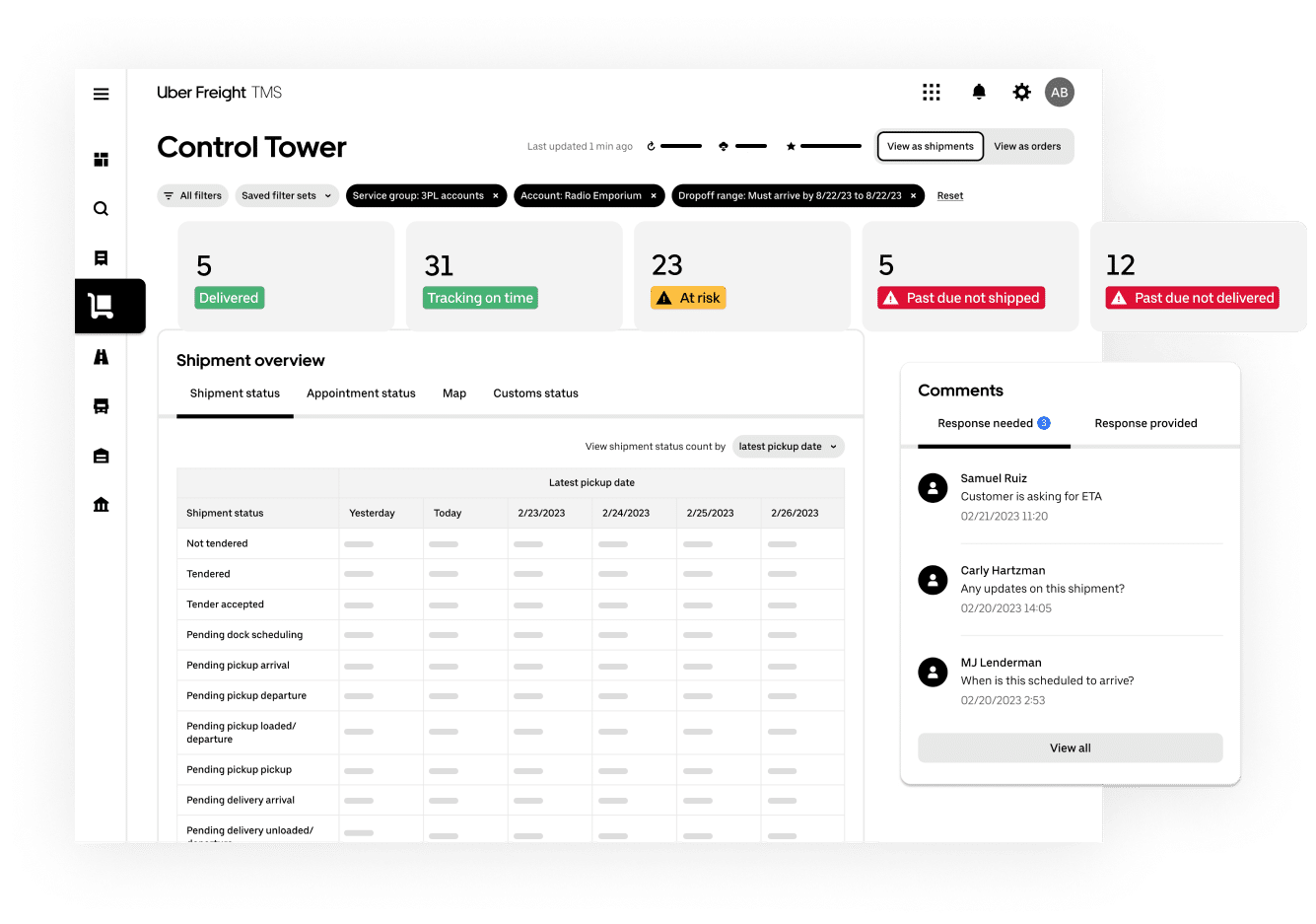
Visibility
Gain full visibility, foresight, and control over your freight
- Secure multimodal and international support including truck, rail, ocean, and air tracking
- Track shipments end-to-end with Control Tower
- Enable customers and stakeholders to track their shipments from the Public Tracking Portal
- Get proactive service alerts powered by Uber Freight’s service prediction algorithm
- Flag, monitor, and manage exceptions
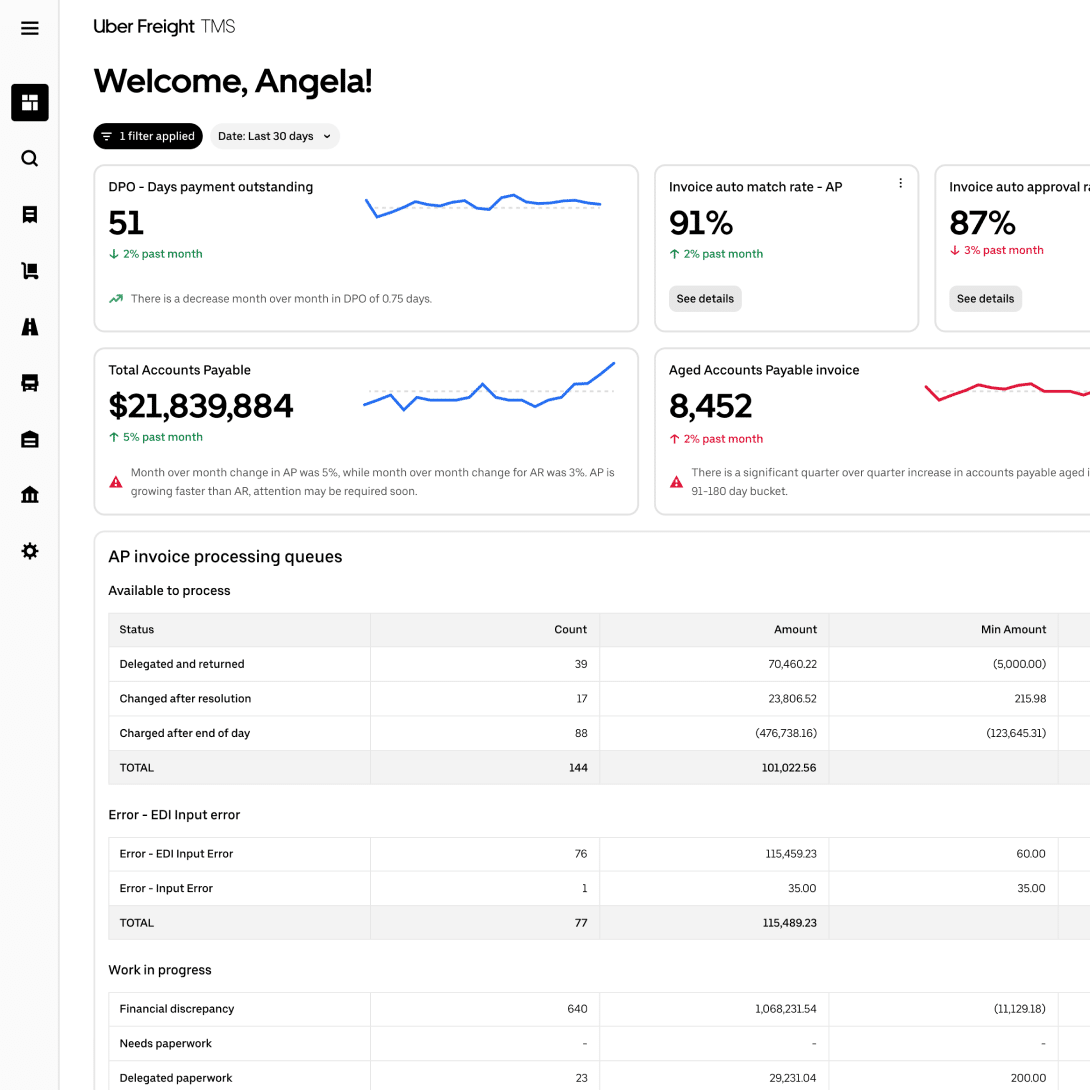
Payments
Boost savings with streamlined carrier document audit and payment
- Automate freight payment and billing, including paperless invoicing
- Help prevent costly rate disputes with streamlined financial workflows
- Help improve accruals and accessorials processes and accuracy
- Forecast freight spend with more accuracy and efficiency
- Help reduce missing paperwork, mischarged late fees, overcharges, and duplicate invoices with carrier payment and document audits
- Create custom payment and audit rules aligning to your financial management frameworks
- Cultivate customer confidence with more accurate and efficient accounting support
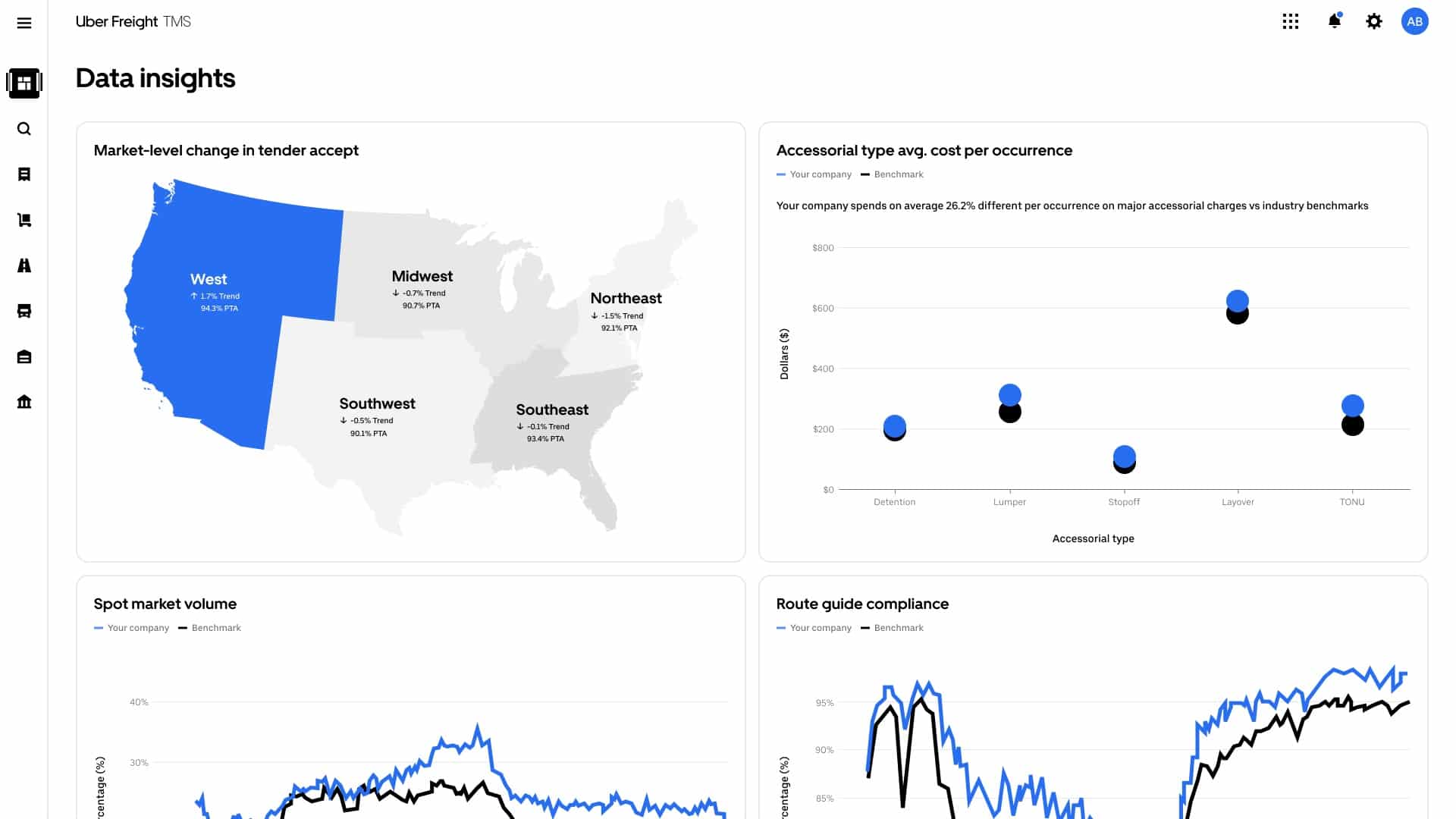
Insights
Make informed decisions with detailed data, analytics, and reporting
- Gain deeper, actionable insights about your network with benchmarking and reporting
- Make more informed decisions with custom report builders, service dashboards, carrier scorecards, and route guide compliance—all fueled by network and industry data
- Compare your facility’s performance against industry standards and best practices with facility insights and benchmarking, provided from carrier experiences with your facility
- Get data-driven recommendations to improve your network

Trusted by leading shippers
Learn more about TMS
FAQs
What is a Transportation Management System?
A Transportation Management System (TMS) is a digital tool adopted for businesses to streamline their logistics and transportation operations. By centralizing transportation data, it empowers transportation teams to forecast network requirements, optimize routing, manage carrier interactions, and track shipments. TMS software also automates integral processes such as load booking and tendering, facilitates payment and settlement, and offers reporting on vital network Key Performance Indicators (KPIs).
An efficient and effective TMS grants shippers both a detailed insight into daily operations and a comprehensive overview of their broader network performance.
How does a Transportation Management System (TMS) work?
A Transportation Management System (TMS) helps optimize and manage the logistics and transportation processes by enabling the following:
Data Integration: A TMS gathers data from various sources within the supply chain, including order management systems, warehouse management systems, carriers, and other logistics partners. This integrated approach ensures real-time and accurate data availability.
Planning & Decision Making: Using this data, the TMS can plan the most efficient transportation routes, select the best carriers based on cost and service levels, consolidate shipments when possible, and choose the best transportation mode (truck, air, ocean, rail, intermodal).
Execution: Once decisions are made, the TMS facilitates the actual transportation process. This includes tendering loads to carriers, confirming shipments, and producing necessary shipping documentation.
Visibility & Tracking: A TMS provides real-time visibility into the transportation process. Users can track shipments, get status updates, and be alerted to any potential delays or issues that arise.
Settlement: After transportation is completed, the TMS can assist in verifying carrier invoices against quoted rates, assist in managing cargo claims in case of damages, and ensuring that carriers are paid in a timely manner.
Reporting & Analysis: TMS solutions typically come with analytics capabilities. These analytics tools generate reports on transportation costs, carrier performance, route efficiencies, and other vital metrics, enabling businesses to identify areas for improvement.
Optimization: Over time, using historical data and advanced algorithms, modern TMS solutions suggest improvements in routing, carrier selection, and other areas to continuously optimize transportation operations.
Communication: A TMS can help bridge communication gaps by providing a centralized platform where shippers, carriers, and other stakeholders can communicate and collaborate.
Automation: Modern TMS platforms include features that automate repetitive tasks, such as load tendering, appointment scheduling, or document generation. This reduces manual work and potential errors.
Modern TMS solutions ultimately streamline the complex web of transportation logistics, making it more efficient, cost-effective, and responsive to shifting business and market conditions.
What is included in Uber Freight TMS?
We meet shippers where they are at. Our TMS modular approach allows us to tailor our module offerings to our customers. This includes data validation to stay on top of data compliance, shipment planning to unlock cross-docking, optimization engines, and deaggregation solutions.
Our execution tool enables automated carrier assignment, tendering, and load rating, in addition to leveraging spot market tech offerings to secure best pricing on non-contracted lanes. For visibility, we provide the ability to track freight end-to-end using technologies including EDI, API, Web and mobile portals, plus partnering with third-party providers to track domestic, international, and cross-border freight.
How customizable is Uber Freight TMS?
You can customize Uber Freight TMS to meet your business’ unique needs. The Uber Freight TMS architecture enables configuration of business rules to personalize your experience, including transit calculation, appointment formulas, and routing/rating logic. Our configuration engine can also setup naming conventions on key references to match your ERP, enabling customized order types and business units.
How does Uber Freight TMS’s predictive service algorithm work?
In partnership with Everstream, we have an operationally trained machine learning model that considers 40+ operations factors that are monitored for load impacts for on time delivery. Our goal is to revolutionize today’s tracking process. Service prediction is a statistical approach to forecasting an outcome and taking proactive measures to avoid service disruptions. The system is based on a learning algorithm that will increase its accuracy over time.

Maximize ROI while minimizing risk
Grow your business with improved productivity, visibility, and control on Uber Freight TMS.

